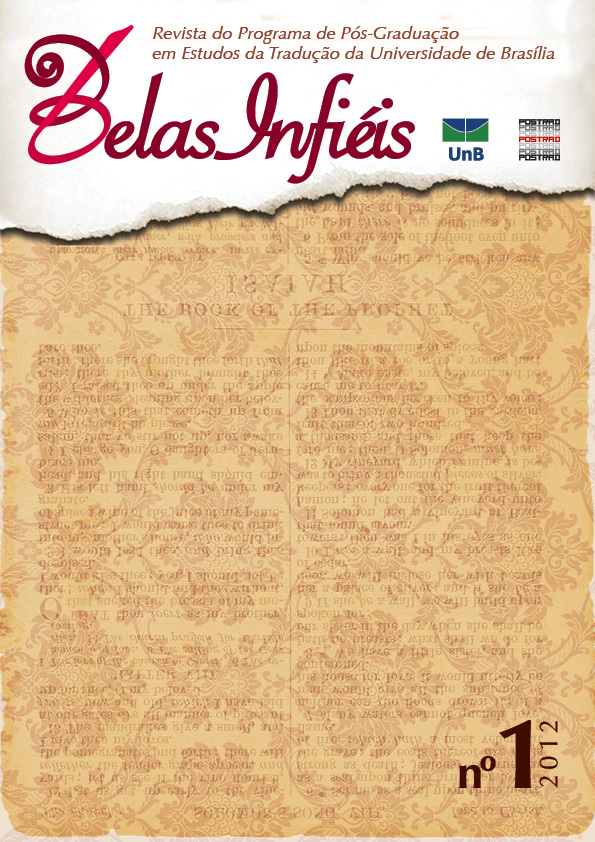TRADUÇÃO DE CONTOS ACHEBIANOS:
PROGRESSÃO NARRATIVA E ESTRATÉGIAS TRADUTÓRIAS
DOI :
https://doi.org/10.26512/belasinfieis.v1.n1.2012.11160Mots-clés :
Tradução comentada, Literatura africana, Chinua AchebeRésumé
O presente artigo discorre sobre algumas das possibilidades de tradução de cinco contos do escritor nigeriano Chinua Achebe. Ele se encaixa em um grupo de escritores que, para ser lido num contexto nacional, precisa que seu texto seja escrito em inglês e não na língua materna, o igbo, no caso de Achebe. Por conta dessa característica, escritores como ele adotam uma postura que busca encontrar soluções tanto estéticas quanto linguísticas. Achebe promove então uma reterritorialização do inglês para que consiga lidar com o contexto africano. A tradução deve, portanto, abarcar a hibridez linguística do texto e buscar estratégias para solucionar as questões decorrentes desse multilinguismo, sem que incorra em seu apagamento.
Téléchargements
Références
ACHEBE, Chinua. Girls at war and other stories.Cape Town, South Africa: Penguin Books, 2009.
AUBERT, Francis Henrik.As variedades de empréstimos.DELTA[on-line]. 2003, vol.19, n.spe, p. 27-42.
BAKER, Mona;SALDANHA, Gabriela (Ed.). Routledge Encyclopedia of Translation Studies. London And New York: Routledge, 2011.
BAMIRO, Edmund (2006). Nativization strategies: Nigerianisms at the intersection of ideology and gender in Achebe’s fiction. World Englishes, 25(3/4),p.315-328.
BERMAN, Antoine. A tradução e a letra. Rio de Janeiro, RJ: 7 Letras, 2007.
CASANOVA, Pascale. A república mundial das letras. São Paulo: Estação Liberdade, 2002.
EHLING, Holger;MUTIUS, Claus-peter Holste-von (Ed.). No condition is permanent: Nigerian writing and the struggle fordemocracy. Amsterdam-new York: Rodopi, 2001.
FERREIRA, Rodrigo Gomes. Análise das notas de tradução em edições brasileiras da Bhagavad-Gita. 2006. 371 f. Dissertação (Mestrado) -Universidade Federal de Santa Catarina, Florianópolis, 2006.
FRANCISCO, Reginaldo. Letra vs. Equivalência na tradução de provérbios e expressões idiomáticas. Scientia Traductionis, Florianopólis, n.7,p.103-118, 2010.
LANDERS, Clifford E.Literary translation: A practical guide. Clevedon: Multilingual Matters, 2001.
MARIA, Luzia de. O que é conto. São Paulo: Brasiliense, 1984. (Primeiros Passos)
MELONE, Thomas. Chinua Achebe et la tragédie de l’Histoire. Paris: Présence Africaine, 1973.
MITTMANN, S. Entre o outro e o eu: efeitos de apagamento e de responsabilidade nas N.T.. In: INDURSKY, Freda; CAMPOS, Maria do Carmo. (Org.). In: Discurso, memória, identidade.Porto Alegre, 2000.p. 188-200.
OBRADOVIC, Nadezda (Ed.). The anchor book of modern African stories. New York: Anchor Books, 2002.
OGBAA, Kalu. Gods, oracles and divinations: Folkways in Chinua Achebe. New Jersey: Africa World Press, 1992.
PEREIRA, Fernanda A. La rencontre entre deux cultures, une analyse de la tétralogie de Chinua Achebe. 2006-2007. 97 f. Dissertação (Mestrado) -Université Rennes 2, Haute-bretagne, 2007.
__________________. O mundo desaba, uma leitura de Things Fall Apart de Chinua Achebe.In: CORRÊA, Ana Laura dos Reis;COSTA, Deane Maria Fonsêca de Castro e; SOUSA, Germana Henriques Pereira de. In: Questões dialéticas da produção literária em nação periférica. Brasília: CEELL, 2009.p. 71 ”“84.
RAJAGOPALAN, Kanavillil. Arundhati Roy. Tradução e Comunicação, Campinas, p.129-138, 2009.
RISTERUCCI-ROUDNICKY, Danielle. Introduction À L’Analyse des Oeuvres Traduites. Paris: Armand Colin, 2008.
SOUSA, Germana.A Voz do Dono e o Dono da Voz: Tensão entre Autor e Tradutor. I Seminário Escritura: linguagem e pensamento. UnB, 2010.
TOOGE, Marly D’Amaro Blasques. Post-colonial Translation, Visibility and Exoticism. Tradução & Comunicação, Campinas, p. 47-60, 2009.
YOUSAF, Nahem. Chinua Achebe. Devon: Northcote House Publishers, 2003.
Téléchargements
Publié-e
Comment citer
Numéro
Rubrique
Licence
Copyright Statement
Given the public access to this journal, the texts are free to use but requires the recognition of the original authorship and initial publication in this journal to be properly stated.
The journal allows the use of works published for non-commercial purposes, including the right to submit the work to publicly accessible databases. Published contributions are the sole and exclusive responsibility of the author(s).
- When submitting papers to be evaluated by the Belas Infiéis journal, the author(s):
- Declare that the contents of the contributions are original and of their original creation, being entirely responsible for their content if there is an objection by third parties.
- Claim to be aware that they should not commit academic plagiarism.
- Declare that the manuscript has not been published, completely or partially, in Portuguese or another language. If it is a translation it should be submitted to the Translated Articles section.
- Declare that the manuscript is not being evaluated by other journals.
- Declare that the manuscript was not submitted to another journal simultaneously.
- Commit(s) to inform the journal of any kind of error or inaccuracy in their contribution (published, in evaluation or in editing) and to collaborate with the editors to make due corrections of the article (when in evaluation or editing) or erratum/retraction (after publication).
- Declare that there is no conflict of interest regarding the published work.
- Authorize its release if it is accepted for publication without any kind of monetary compensation.
- Agree to assign non-exclusive rights to publication to the magazine, remaining free to make their contribution available in other media as long as the publication of the first version in Belas Infiéis magazine is mentioned. They also authorize Belas Infiéis to assign their texts for reproduction in content indexers, virtual libraries and similar platforms.
- Maintain copyright and grant the journal the right of first publication, the work being licensed under theCreative Commons Attribution License.
- Is/Are allowed and encouraged to publish and distribute their work online after the editorial process, which may increase the impact and citation of the published work.
- Authorize the editorial team to make textual adjustments and to adapt the article to the publication rules, when necessary.



















